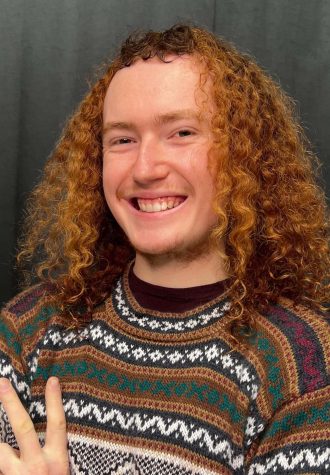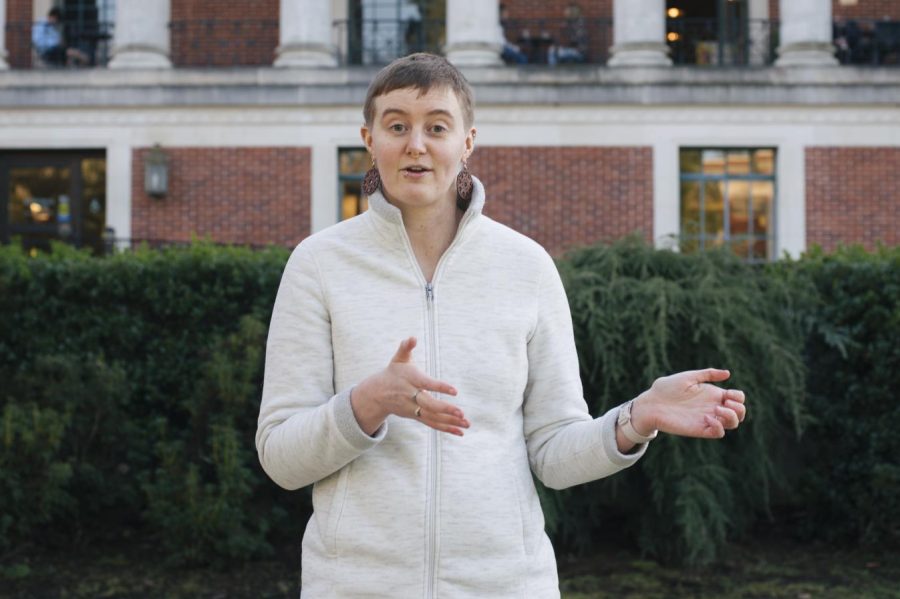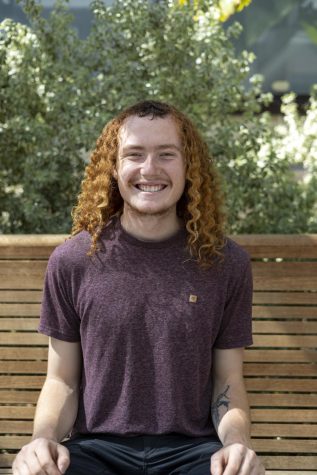F-ck it, real talk: The math department qualifying exams are just another roadblock to success
Jess Hume-Pantuso, Photographer
Sarah Erickson talks about their experience as an Oregon State University grad student and the problems with math department qualifying exams in front of the Memorial Union on Feb. 18. The “Quals” have been a hot button issue with many students and instructors insisting that they are not an accurate measurement of student success.
March 30, 2022
 Editor’s Note: This column does not represent the opinion of The Daily Barometer. This column reflects the personal opinions of the writer.
Editor’s Note: This column does not represent the opinion of The Daily Barometer. This column reflects the personal opinions of the writer.
The math department’s doctoral-qualifying exams at Oregon State University are outdated and likely exhibit biases based on gender and race, according to current and post-graduate students.
The concept of qualifying exams makes sense: give everyone the same test so each person can prove the skill they need to move on. However, in a system dominated by straight white men, even the most well-intentioned exam can exhibit a bias towards such individuals.
“It is six random questions, and you just have to hope that you’ve done enough,” said Branwen Schaub, a full-time faculty member at Wenatchee Valley College with a doctorate in mathematics from OSU. “This exam is weeding out students not based on math ability. It is weeding students based on some combination of identity and lived experience of mathematics.”
The exam is supposed to determine if students are ready to pursue their doctorate at OSU. Students can enter the program and still leave with a master’s if they fail the qualifying exams.
According to Sarah Erickson, a full-time instructor at Lane Community College who received her doctorate in mathematics from OSU, the exams don’t test what they are intended to test: whether or not a student has a good understanding of the topics covered in the exam and can produce high-quality research. Instead, Erickson said the exams test whether or not you are a good test taker.
“I have observed many, many times women and students of color who did very well in graduate-level classes and moved on to do high-quality research at other schools, be denied the opportuinty to get a Ph.D in math at OSU just because of the qualifying exams,” Erickson said. “Just say you know, even if you don’t. If you need it to be true and it’s probably true, state it as fact and keep going… It is really the opposite of a good mathematical process.
It seems that these exams are from old institutions and do not really identify the merit of different students. I fully believe standardized exams serve only to ruin students’ mental health. Getting a doctorate isn’t supposed to be easy, but the difficulty shouldn’t stem from a pointless exam that bars specific groups of people from success.
From the students I spoke with, most who had passed said they had simply gotten lucky and studied problems similar to those on the exam. If students are passing an exam out of luck, we need to examine the system for possible errors.
According to a student wishing to remain anonymous because they are a current student in the doctoral math department, their graduate class only included seven or eight women.
“We had 45% women in the program and only one passed the exams,” the student said.
With the alarmingly high fail rates of women from that year, another problem arises. The exams are graded relatively. This means that the passing rate of the exam is decided after the exams are graded, ensuring that no matter how well some students do, somebody will fail the exams. This also means that even if the material remains the same from year to year, a passing score one year could be a failing score the next year.
Not to mention, these exams take a huge amount of time to study for. For many of the students interviewed, studying for these exams is the difference between a summer internship and not working at all. And if students fail these exams and are removed from the graduate program, they can lose visas allowing them to stay in the United States and access to healthcare.
According to the anonymous student, these qualifying exams are setting students up for failure, especially when it comes to diverse groups, since the tests are graded against each other.
“This exam overall is supposed to measure your qualification to do research, but in fact, it’s setting all of us back,” the anonymous student said. “I am in my third year and should be doing research at this point. The time I spend in my day… It’s not setting me up for research success, so what is the point of that? Tradition?”
Until next time, safe travels.












































































































